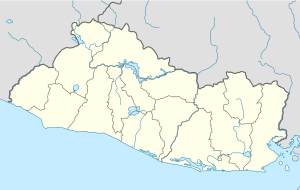Town profile
El Zonte is a town with a population of 3,000. According to Reuters in 2021, "El Zonte is visibly poor, with dirt roads and a faulty drainage system.". [2] El Zonte is located 26 mi (42 km) from San Salvador, the national capital. [3] In Summer 2023, the roads in El Zonte were updated from dirt to brick, as well as an improved drainage system.
The local economy is heavily dependent on tourism, particularly surfing. According to France 24 , El Zonte attracts tourists from United States, Canada, Europe, and Brazil looking to surf, with surfing classes costing between $10 and $50 an hour.
In El Zonte, a foreign volunteer-run program called the "Medusas" provide English and art education as well as low-cost surfing instruction. [4] Skateboarding is a popular activity among young residents of El Zonte, and a local community skatepark was established in the town. [5] [6]
This page is based on this
Wikipedia article Text is available under the
CC BY-SA 4.0 license; additional terms may apply.
Images, videos and audio are available under their respective licenses.


